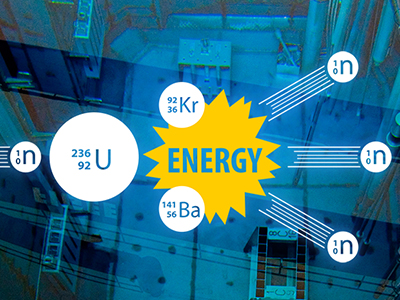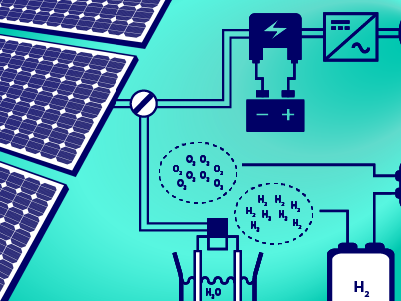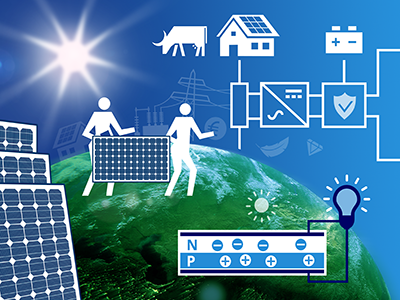Overview
Curious where the radionuclides used to diagnose and treat cancer in hospitals come from? In this course you will obtain a deeper understanding of radionuclide production, which production facilities can be used, and how to obtain high quality radionuclides.
Nuclear chemistry is an exciting and challenging field that is continuously evolving. Radionuclides (radioactive isotopes) play a vital role in this field, with applications ranging from medical diagnostics and cancer therapy to monitoring of environmental pollution and industrial processes such as inspection, monitoring and gauging. But how are these radionuclides actually produced?
This course is intended for early-career professionals in the nuclear field, whether in industry, research, academia, government or healthcare. You will gain a thorough knowledge of the production of medical and industrial radioisotopes. Key topics include:
- The basics of radiation and radioactivity
- Production facilities and generators
- Factors influencing radionuclide production
- Radionuclide separation and quality control
The course features several podcasts made in collaboration with experts in the field. In these discussions, different relevant topics will be addressed: What cool things can we do with gamma spectrometers? What is the controversy surrounding 99Mo? How do you make an accelerator target? What are potential issues of quality control?
This course has been designed by TU Delft’s experts from the Department of Radiation, Science and Technology at the TU Delft | Reactor Institute. It provides a clear and comprehensive overview of how radionuclides are produced, making it an ideal choice for anyone seeking to deepen their knowledge in this field. Our specialists in the fields of radiochemistry and nuclear engineering are eager to share their knowledge with you!
This course will be of great value for graduating students interested in nuclear chemistry, professionals working with radionuclides who want to understand production bottlenecks, hospital staff operating medical scanners or staff curious about which production facilities can be used, and how to obtain the high-quality radionuclides for radiopharmaceutical development, and researchers whose work involves radionuclide applications, and more.
What You'll Learn
After this course you will be able to:
- Discuss the basics of radioactivity and decay
- Determine the best way to produce high-quality radionuclides
- Choose the most suitable production facility by weighing their respective advantages and disadvantages
- Calculate production levels, taking radioactive equilibrium situations into account
- Evaluate which chemical separation methods are applicable in different situations
- Explain how quality control is applied in practice
Details
Course Sylllabus
The course is organized in four modules, which can be followed in two different tracks. The beginner track introduces core concepts, while the advanced track dives into more complex material. Both tracks are available to both audit and verified learners. A brief summary of each unit is presented below.
Module 1. Introduction into radioactivity
In this module the basics of radioactivity, nuclear reactions and decay will be discussed. What is radioactivity, half-life and a radioisotope, and what types of decay exist? You will learn how to use the nuclide chart and how radiation interacts with matter. You will also learn to interpret a gamma spectrum and what detectors can be used for which type of decay. At the end there will be a podcast where an expert on gamma spectrometry discusses interesting applications of the technique.
Module 2. Generators
In the generators module you’ll learn how to calculate radioactive equilibria, understand different types of equilibrium, mother/daughter relationships and successive decay. Some examples of currently used radionuclide generators will be presented. At the end of the module, an expert from the field will discuss the controversy surrounding 99Mo production.
Module 3. Production of radioisotopes
After successfully completing this module, you’ll be able to determine which production facilities are most appropriate for producing a certain radioisotope, based on their respective advantages and disadvantages. You'll also learn to calculate production levels and how quality control is applied in practice. In the closing podcast of this week a targetry expert will discuss the practical do’s and don’ts when designing an accelerator target.
Module 4. Separation of radioisotopes
In this module, you will learn which chemical separation methods are used for the purification of produced radioisotopes, along with some practical applications of these methods. You’ll also learn how quality control is applied in practice. This module features a virtual lab, where you can produce and separate your own radionuclides! The module concludes with a podcast by an expert explaining radiolabeling, QC and potential issues.
Qualifications
Chartered Engineering Competences
All our online courses and programs have been matched to the competences determined by KIVI’s Competence Structure, a common frame of reference for everyone, across all disciplines, levels and roles.
These competences apply to this course:
- A1: Extend your theoretical knowledge of new and advancing technologies.
Admission
This is a Massive Open Online Course (MOOC) that runs on edX.
Prerequisites
You should have a background in chemistry / physics / mathematics / biology / materials engineering / biomedical engineering (/ aerospace engineering) or a related field.


